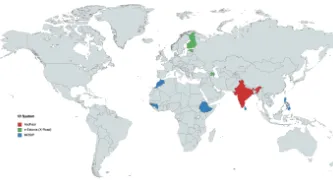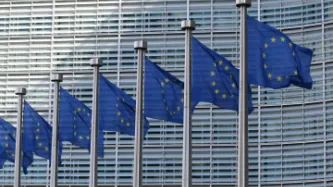Advanced Search
Content Type: Press release
In what could be seen as one of the strongest sanctions against the company in Europe, the Information Commissioner’s Office (ICO), which is tasked with enforcing data protection legislation in the UK, has today announced its provisional intent to issue a potential fine of £17 million against the controversial facial recognition company Clearview AI.
Clearview AI, which only received worldwide attention following a New York Times report back in January 2020, is a company whose business model…
Content Type: Long Read
Governments around the world are increasingly making registration in national digital ID systems mandatory for populations, justifying its need on a range of issues from facilitating access to services, to national security and fighting against corruption. This is an attempt to create a "foundational identity" for an individual, or "a single source of truth" about who someone is, according to a government agency. These identity systems are run by governments, sometimes by private companies, or…
Content Type: Advocacy
Some of the most vulnerable groups in Mexico are amongst the groups at risk from a draft General Population Law that creates a biometric “Unique Digital Identity Card” (CUID), argue civil society organisations. The proposed law has now reached the senate, and has raised serious concerns from civil society organisations. Led by our global partner in Mexico Red en Defensa de los Derechos Digitales (R3D), PI along with 25 organisations have signed a joint letter to the members of the senate,…
Content Type: Long Read
Introduction
Technology has driven a number of changes in the way that financial services are packaged and accessed by consumers. These changes have led to the rise of fintech, a data intensive industry that has been touted for its convenience and as an alternative to traditional financial services.
The current article looks at the use of digital loan Apps in Philippines and Kenya and contextualises the global discussions on fintech which we have been monitoring for some years. Research…
Content Type: News & Analysis
After almost 20 years of presence of the Allied Forces in Afghanistan, the United States and the Taliban signed an agreement in February 2020 on the withdrawal of international forces from Afghanistan by May 2021. A few weeks before the final US troops were due to leave Afghanistan, the Taliban had already taken control of various main cities. They took over the capital, Kabul, on 15 August 2021, and on the same day the President of Afghanistan left the country.
As seen before with regime…
Content Type: Long Read
When you buy a brand-new low-cost phone, it’s likely to come pre-installed with insecure apps and an outdated operating system. What this means is that you or your loved ones could be left vulnerable to security risks or to having their data exploited. Privacy shouldn’t be a luxury. That’s why we advocate for companies to provide the latest security features and privacy protections for both low- and high-cost phones.
Content Type: Advocacy
On 6 August 2021, the World Health Organisation (WHO) published its technical specifications and implementation guidance for “Digital Documentation of COVID-19 Certificates: Vaccination Status” (DDCC:VS) following months of consultations. As governments around the world are deploying their own Covid-19 certificates, guidance from the global health agency was expected to set a global approach, and one that prioritises public health. As such, we would expect the WHO to identify what these…
Content Type: News & Analysis
Today Apple announced a set of measures aimed at improving child safety in the USA. While well-intentioned, their plans risk opening the door to mass surveillance around the world while arguably doing little to improve child safety.
Among the measures, Apple has announced that it is to introduce “on-device machine learning” which would analyse attachments for sexually explicit material, send a warning, and begin scanning every photo stored on its customers’ iCloud in order to detect child…
Content Type: Long Read
For many, browsing the internet or checking social media comes with its fair share of being targeted with ads selling “fad diet” subscription-based programmes, magic weight-loss powders, or promising a secret trick to lose weight quickly. Some of the products and programmes sold have been described as scams, with a very real impact for those suffering from eating disorders and those who fall prey to these ads. This is even more problematic due to the Covid-19 pandemic, which has seen the…
Content Type: News & Analysis
This article was written by Abdías Zambrano, Public Policy Coordinator at IPANDETEC, and is adapted from a blog entry that originally appeared here.
Digital identity can be described as our digital personal data footprint, ranging from banking information and statistics to images, news we appear in and social network profiles, interactions with and in digital platforms, and information contained in private and public repositories. Our whole life is online, often leaving us with little choice…
Content Type: News & Analysis
Legislation to "strengthen the integrity of UK elections and protect our democracy" through the Elections Integrity Bill was introduced to parliament this week.
This legislation will require people, for the first time in Great Britain, to show a state-issued photo ID, such as a driving license or passport, in order to exercise their right to vote, perhaps by the 2023 General Elections. The changes would affect elections in England, Scotland and Wales while voters in Northern Ireland are already…
Content Type: Long Read
Now more than ever with a global pandemic happening, our lives are being shaped by our interaction with the digital world. Work meetings on Zoom followed by Skype with family before a quick run with your favourite running app and a Google search for your next meal: technologies and services offer us a lot and greatly improve our daily lives. But what's the real cost of these tools we rely on so much?
A lot of these companies, especially those offering free services, collect data about you. It…
Content Type: Long Read
Among the many challenges of 2020, the impact on elections around the world kept us all on the edge of our seats. 75 countries postponed national and local elections due to Covid 19. Of the elections that went ahead, we saw Covid safe measures at polling stations (South Korea led the way forward in April) an increase in postal voting (who can forget the USA, but also Poland) and political parties in Uganda conducting "virtual" campaigns as mass rallies and in person campaign meetings were…
Content Type: Long Read
Political parties depend on data to drive their campaigns, from deciding where to hold rallies, which campaign messages to focus on in which area, and how to target supporters, undecided voters and non-supporters, including with ads on social media. Political parties increasingly hire private companies to do the bulk of this work, and our primary concern is how these companies use personal data to “profile” people and drive election campaigning.
As part of PI’s programme of work on Defending…
Content Type: Advocacy
An interoperability requirement for “gatekeeper” firms would:
give a fair chance for competition on the merits of new services.
contribute to meeting the three key objectives of the Commission’s February 2020 Digital Future Communication: ensuring technology works for people; a fair and competitive economy and an open, democratic and sustainable society.
As the letter notes, "major digital competition reviews over the last two years [...] have recommended interoperability requirements.…
Content Type: Long Read
In 2019, we exposed the practices of five menstruation apps that were sharing your most intimate data with Facebook and other third parties. We were pleased to see that upon the publication of our research some of them decided to change their practices. But we always knew the road to effective openness, transparency, informed consent and data minimisation would be a long one when it comes to apps, which for the most part make profit from our menstrual cycle and even sometimes one’s desire to…
Content Type: News & Analysis
An excerpt of this piece was first published in June 2020 in Adbusters, an international not-for-profit magazine produced by a global collective of artists and activists who want to 'shake up complacent consumer culture'.
Big oil. Big tobacco. Big pharma. How did we let ‘big tech’ happen? You would have thought humanity would learn its lesson. That nothing good comes of the mass accumulation and concentration of power into the hands of so few.
The internet was meant to be different. No…
Content Type: Frequently Asked Questions
On 27 October 2020, the UK Information Commissioner's Office (ICO) issued a report into three credit reference agencies (CRAs) - Experian, Equifax and TransUnion - which also operate as data brokers for direct marketing purposes.
After our initial reaction, below we answer some of the main questions regarding this report.
Content Type: News & Analysis
Privacy International (PI) welcomes today's report from the UK Information Commissioner's Office (ICO) into three credit reference agencies (CRAs) which also operate as data brokers for direct marketing purposes. As a result, the ICO has ordered the credit reference agency Experian to make fundamental changes to how it handles people's personal data within its offline direct marketing services.
It is a long overdue enforcement action against Experian.…
Content Type: News & Analysis
Privacy International (PI) has today warned UK regulatory and law enforcement bodies about the potential deployment of an extensive and potentially nationwide police facial recognition surveillance system. We are urging them to investigate and take steps to ensure that no ‘backdoor’ for unlawful facial recognition surveillance will be developed under the umbrella of a crime reporting system.
According to pricing and data-sharing templates, UK surveillance company Facewatch is offering to…
Content Type: Report
Many countries in the world have existing ID cards - of varying types and prevalence - there has been a new wave in recent years of state “digital identity” initiatives.
The systems that states put in place to identify citizens and non-citizens bring with them a great deal of risks.
This is particularly the case when they involve biometrics - the physical characteristics of a person, like fingerprints, iris scans, and facial photographs.
Activists and civil society organisations around the…
Content Type: Report
A common theme of all major pieces of national jurisprudence analyzing the rights implications of national identity system is an analysis of the systems’ impacts on the right to privacy.
The use of any data by the State including the implementation of an ID system must be done against this backdrop with respect for all fundamental human rights. The collection of data to be used in the system and the storage of data can each independently implicate privacy rights and involve overlapping and…
Content Type: Report
Identity systems frequently rely on the collection and storage of biometric data during system registration, to be compared with biometric data collected at the point of a given transaction requiring identity system verification.
While courts have arguably overstated the effectiveness and necessity of biometric data for identity verification in the past, the frequency of biometric authentication failure is frequently overlooked. These failures have the potential to have profoundly…
Content Type: Report
National identity systems naturally implicate data protection issues, given the high volume of data necessary for the systems’ functioning.
This wide range and high volume of data implicates raises the following issues:
consent as individuals should be aware and approve of their data’s collection, storage, and use if the system is to function lawfully. Despite this, identity systems often lack necessary safeguards requiring consent and the mandatory nature of systems ignores consent…
Content Type: Report
While identity systems pose grave dangers to the right to privacy, based on the particularities of the design and implementation of the ID system, they can also impact upon other fundamental rights and freedoms upheld by other international human rights instruments including the International Covenant on Civil and Political Right and the International Covenant on Economic, Social and Cultural Rights such as the right to be free from unlawful discrimination, the right to liberty, the right to…
Content Type: Report
Rather than providing a list of arguments, as is the case in the other sections of this guide, the fifth section provides a general overview describing the absence of consideration of these themes in existing jurisprudence and the reasons why these themes warrant future consideration including identity systems’ implications for the rule of law, the role of international human rights law, and considerations of gender identity.
Democracy, the Rule of Law and Access to Justice: This analysis of…
Content Type: Explainer
The lead author of this piece is Elettra Bietti, a doctoral student at Harvard Law School and volunteer for Privacy International
Network effects
Social media companies and other digital business models are driven by so-called network effects. A network effect (also called a network externality) is a service’s propensity to improve functionally as the number of people using it and the amount of data collected through it increases. For example, as the number of Facebook users increases, Facebook…
Content Type: News & Analysis
No doubt this is turning out to be a summer full of news about internet companies' digital dominance.
In June, Google notified the European Commission of its plan to acquire Fitbit - a plan that we immediately identified would raise grave concerns for our well-being as consumers.
Today the European Commission has made its decision. And it's good news.
The European regulator has decided to undertake a detailed 'Phase 2' investigation, rather than just green light Google's plans, voicing also the…
Content Type: News & Analysis
Banning TikTok? It's time to fix the out-of-control data exploitation industry - not a symptom of it
Chinese apps and tech companies have been at the forefront of the news recently. Following India's ban of 59 chinese apps in July, President Trump announced his desire to ban TikTok, shortly followed by his backing of Microsoft's intention to buy the US branch of its parent company ByteDance. Other than others lip syncing his public declaration, what does President Trump fear from this app, run by a firm, based in China?
It's all about that data
One clear answer emerges: the exploitation of…
Content Type: News & Analysis
New technologies continue to present great risks and opportunities for any users but for some communities the implications and harms can have severe consequences and one of the sectors facing increasing challenges to keep innovating whilst protecting themselves and the people they serve is the humanitarian sector.
Over the course of engagement with the humanitarian sector, one of our key observations has been how risk assessments undertaken in the sector omitted to integrate a hollistic…




























